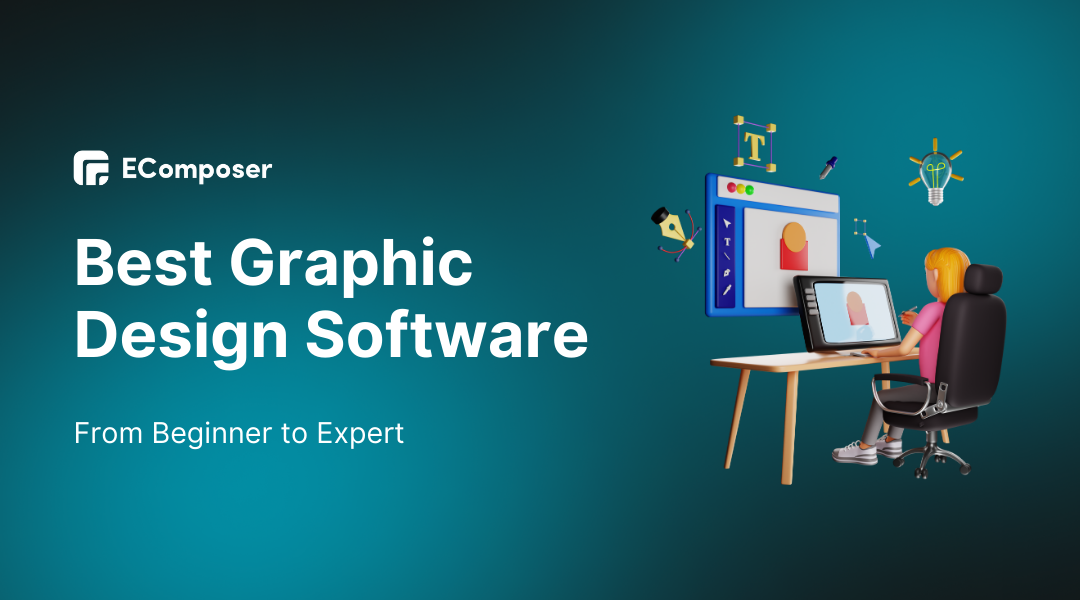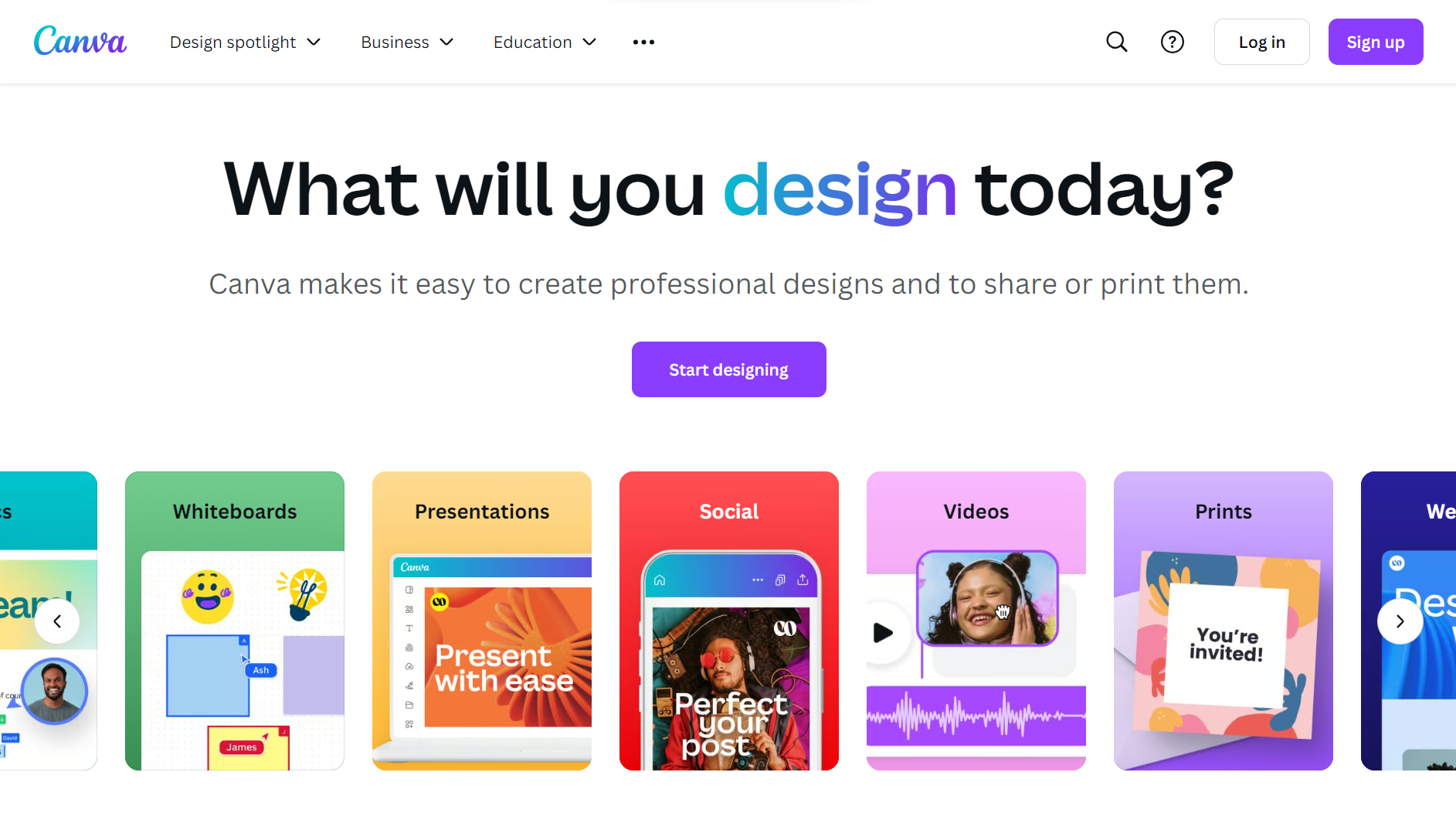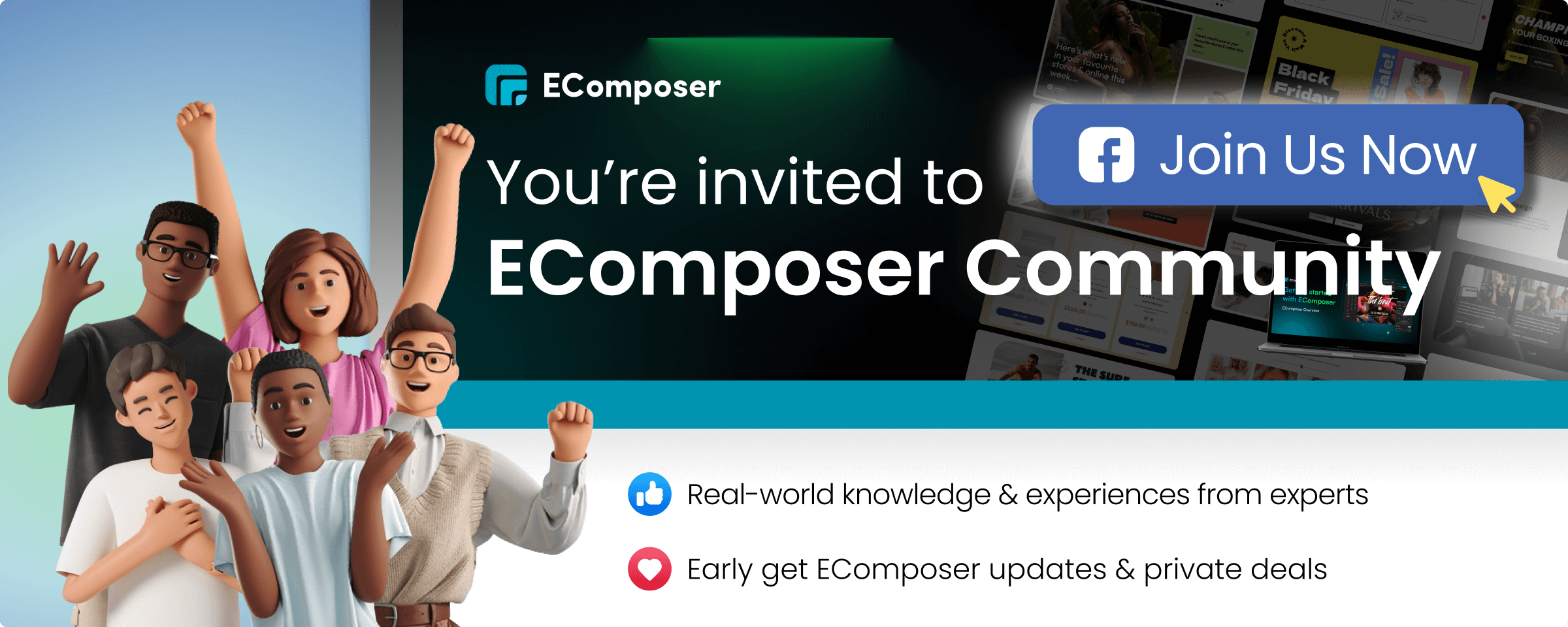15+ Best Graphic Design Software From Beginner to Expert in 2025

Table Of Contents
Having the right graphic design software is essential for transforming ideas into stunning visuals. With the rapid advancements in technology and the rise of AI-driven design features, there’s no shortage of powerful software to explore. From crafting social media content and logos to creating intricate digital art and marketing materials, graphic design tools come in a variety of options tailored to different needs and skill levels. The best part? You don’t need to break the bank to find quality software—many free and affordable options can help you unleash your creativity.
In this blog, we’ll dive into the top 15+ Graphic Design Software for 2025, offering options for everyone, from beginners just starting to seasoned pros. Let's find the perfect software to take your designs to the next level!
What is Graphic Design Software?

Graphic design software is a program or set of tools that helps you create and edit digital visuals. Whether you want to design a logo, create eye-catching social media posts, or even make 3D models, this software is what brings your creative ideas to life.
Some programs, like Adobe Photoshop and Illustrator, are well-known and have been used by professionals for years. These tools offer powerful features for detailed edits and creating high-quality designs. However, more beginner-friendly tools, like Canva and Figma, have made graphic design accessible to just about anyone. These platforms are easy to use and perfect for people who don’t have a lot of design experience but still want to create beautiful, professional-looking visuals.
In short, graphic design software gives you everything you need to create digital art and designs, no matter your skill level.
What is The Importance of Software for Graphic Design?
Graphic design software is essential because it provides the tools you need to bring your creative ideas to life in a way that is efficient, professional, and visually impactful. Here’s why it matters:
- File Flexibility: A good design tool lets you work with different file types (like PNG, JPEG, or vector files). It should allow you to resize images without losing quality, whether you're shrinking or enlarging them.
- Background Eraser: Removing backgrounds from images should be simple. You don’t need fancy tools—just a reliable eraser that works easily, even if you're using a mouse or touchpad.
- Templates: Pre-designed templates save you time by giving you a starting point. You can pick one that’s close to what you need and customize it, or start from scratch if you prefer.
- Social Media Tools: Some design software allows you to create and even schedule social media posts directly from the program. This saves time by allowing you to design and post without switching between different platforms.
Graphic design software gives you everything you need to create high-quality visuals while making the process quicker and simpler.
Top 15 Best Graphic Design Software in 2025
1. Adobe Illustrator

Adobe Illustrator is the industry-standard software for creating vector-based graphics, widely used for professional portfolio artwork, infographics, and icons. It continues to innovate, introducing features like the AI-powered Generative Recolor tool, which allows designers to explore limitless color palettes and themes. Though feature-rich, Adobe Illustrator can be expensive and resource-heavy, making it less ideal for those on a tight budget.
|
Pros |
Cons |
|
|
Best For: Designing vector graphics that can be scaled larger or smaller without losing quality, making it perfect for logos, icons, and illustrations.
Platforms: Windows, Mac, iPad, Android
Pricing: $37.99 per month (no discount for annual prepayment)
2. Adobe Photoshop

Adobe Photoshop has remained the go-to software for desktop publishing and image editing. It offers a comprehensive set of tools for both beginners and professionals, with a user-friendly interface and detailed tutorials. Photoshop excels in photo editing, retouching, and creative manipulation, making it a top choice for photographers, graphic designers, and digital artists. Though its features are impressive, the premium price may be a barrier for some users.
|
Pros |
Cons |
|
|
Best For: Photo editing, retouching, manipulation, and digital artwork creation.
Platforms: Windows, Mac, iOS, Android
Pricing: Starts at $20.99 per month (Photoshop only) or $54.99 per month for all Creative Cloud apps.
3. Adobe InDesign

Adobe InDesign is a specialized desktop publishing software perfect for creating long-form multi-page documents such as books, magazines, reports, and brochures. While it integrates well with other Adobe programs, its user interface may feel challenging for beginners. InDesign offers a powerful set of tools for designing image-heavy posters, presentations, and documents, but it can be resource-intensive and may take time to master.
|
Pros |
Cons |
|
|
Best For: Creating and designing image-heavy documents like magazines, reports, and brochures with precise layouts.
Platforms: Windows, Mac
Pricing: $20.99 per month
4. Adobe Spark

Adobe Spark is a free, user-friendly alternative to Adobe's more robust design tools like Illustrator. While it doesn’t offer the same extensive feature set, Spark is an excellent choice for quickly creating posters, logos, and social media content. It comes with free templates, background removal, and a built-in social scheduler, making it ideal for marketers and small business owners looking for easy and fast content creation.
|
Pros |
Cons |
|
|
Best For: Creating quick and simple designs for social media, posters, logos, and marketing materials with an easy-to-use platform that includes basic design tools and a social scheduler.
Platforms: Windows, Mac, Android, iOS
Pricing:
- Free (with limited features)
- Premium features are available with a subscription
5. Canva

Canva is a versatile, beginner-friendly design tool ideal for creating everything from social media posts and web designs to T-shirts and presentations. Its drag-and-drop interface makes it easy for non-designers to produce professional-quality designs. Canva offers a vast collection of templates, images, and fonts, though many features require in-app purchases. The free version is great for individuals or small teams, while paid plans unlock more advanced features.
|
Pros |
Cons |
|
|
Best For: Quick and easy design creation for beginners, especially for social media posts, presentations, and marketing materials across a wide range of industries.
Platforms: Web browser, Windows, Mac, Android, iOS
Pricing:
- Free (with limited features)
- $149.90/year for the first five people for a paid plan
6. Figma

Figma is a powerful, cloud-based design tool that offers real-time collaboration for UI/UX designers, product teams, and creative professionals. With a generous free plan that includes unlimited cloud storage, Figma is ideal for teams who need to prototype, design, and comment on projects together. It supports organizational-level customization with private plugins, making it a great tool for companies needing scalable solutions.
|
Pros |
Cons |
|
|
Best For: UI/UX design, prototyping, and real-time collaboration
Platforms: Windows, Mac, Linux, Chrome OS
Pricing:
- Free (with limited features)
- Paid plans start at $12/month per editor
7. Affinity Photo 2

Affinity Photo 2 is an excellent alternative to Adobe Photoshop, offering a full-featured raster graphics editor at a one-time affordable price. It provides high-end retouching capabilities, RAW image processing, focus stacking, and third-party plugin support, making it a popular choice for photographers, graphic designers, and retouching artists. Affinity Photo delivers powerful image editing and manipulation tools without the need for a subscription.
|
Pros |
Cons |
|
|
Best For: photographers, graphic designers, and retouching artists who want a powerful, budget-friendly alternative to Adobe Photoshop.
Platforms: Windows, Mac
Pricing: One-time payment of $69.99
8. Affinity Designer 2

Affinity Designer 2 is a cost-effective, versatile design tool ideal for both freelancers and businesses. It excels in handling both vector and raster graphics, and it supports a wide range of file types, such as PSD, SVG, EPS, and PDF. Known for its efficient performance, particularly on the iPad, it enables seamless transitions between vector and raster workspaces, offering an adaptable and resource-friendly workspace. This software provides a competitive alternative to subscription-based programs like Adobe Illustrator.
|
Pros |
Cons |
|
|
Best For: graphic designers, illustrators, and web creators who need a professional-grade tool at an affordable price.
Platforms: Windows, Mac, iPad
Pricing: One-time payment of $69.99
9. Pixlr

Pixlr is a web-based, AI-powered image-editing tool accessible via desktop, iOS, and Android. It provides essential editing functions without the complexity of professional software, making it a great option for beginners or casual users. With support for multiple file formats like SVG and PSD, Pixlr offers an affordable image editing experience with free and low-cost subscription options. Initially part of Autodesk, Pixlr now stands independently with a growing ecosystem of features.
|
Pros |
Cons |
|
|
Best For: beginners, social media managers, and casual users who need quick and straightforward photo editing
Platforms: Cloud, Web-based, iPad, Android
Pricing: Free trial and free version available; ad-free plans start at $0.99/month.
10. CorelDraw Graphics Suite

CorelDRAW is a comprehensive graphic design editor that specializes in vector illustration and page layout. Once a formidable competitor to Adobe Illustrator, it continues to be a powerful choice for digital and print design projects. CorelDRAW offers a robust suite of tools for graphic editing, photography, and typography. It's available on major platforms, including Windows, Mac, Web, and iPad, with the CorelDRAW.app enabling real-time collaboration.
|
Pros |
Cons |
|
|
Best For: graphic designers, small business owners, and print professionals
Platforms: Windows, Mac, Web, iPad
Pricing: Subscription pricing starts at $22.42/month (paid yearly) or a one-time license fee of $549.
11. GIMP

GIMP (GNU Image Manipulation Program) is one of the first open-source graphic design tools renowned for its robust photo editing capabilities. It serves as a lightweight alternative to heavyweights like Adobe Photoshop, providing a similar set of functionalities for free. GIMP features a customizable workspace and user-friendly navigation, making it a versatile choice for a range of editing tasks.
|
Pros |
Cons |
|
|
Best For: budget-conscious graphic designers, photographers, and digital artists
Platforms: Windows, Mac, Linux
Pricing: Free
12. DesignWizard

DesignWizard is a user-friendly graphic design tool, ideal for beginners looking to create various designs quickly. It features a large database of images and over 10,000 free templates, offering a straightforward interface that simplifies the design process. While it excels at generating new content, it has limitations when it comes to editing existing assets.
|
Pros |
Cons |
|
|
Best For: individuals and small businesses needing quick and straightforward designs for social media, promotional materials, and other marketing collateral
Platforms: Windows
Pricing: $9.99/month for the paid version; the free version is available with limited features.
13. Lunacy

Lunacy is a next-generation graphic design software that prioritizes efficiency and user-friendliness. It allows designers to work both online and offline, positioning itself as an alternative to tools like Figma and Sketch. With no subscription fees and a straightforward learning curve, Lunacy caters to freelancers and mid-sized organizations looking for a powerful yet accessible design solution.
|
Pros |
Cons |
|
|
Best For: Freelance designers and mid-sized organizations that need a robust design tool without the overhead of subscriptions
Platforms: Windows, Mac, Linux
Pricing: Free, with no subscription or up-front fees.
14. Paint 3D

Paint 3D is a classic Microsoft design tool that has been revamped and is now free for Windows users. While it doesn't match the capabilities of more advanced graphic design software, it offers essential features like realistic textures, 2D cutout creation, and a selection of 3D elements. It serves as an excellent entry point for beginners looking to explore graphic design without a steep learning curve.
|
Pros |
Cons |
|
|
Best For: beginners who want a straightforward tool to get started with graphic design.
Platforms: Windows
Pricing: Free
15. Sketch

Sketch is a Mac-only vector-editing software designed for graphic designers, offering a customizable interface and a strong focus on workflow management. It provides basic photo editing capabilities along with extensive plugin support, making it suitable for various design needs. While it may not have the advanced features of other graphic design software, its simplicity and community support make it a go-to choice for many designers.
|
Pros |
Cons |
|
|
Best For: graphic designers and illustrators looking for a straightforward, vector-based editing tool on Mac
Platforms: Mac
Pricing: Starts at $10/month/editor, with a free 30-day trial available.
What Makes a Good Software For Graphic Design?

Choosing the right graphic design software depends on your needs, skills, and the platform you're working on. Here's what makes a great graphic design tool:
- Cross-Platform Availability: Good software should work on multiple platforms like PC, Mac, and mobile. This flexibility allows you to switch between devices depending on your work style and location.
- Ease of Use: If you’re a beginner, software that is easy to learn and use is essential. PC and mobile versions often have more intuitive interfaces than Macs, making them great for those just starting their design journey.
- Performance for Professionals: For more experienced designers, especially those working in high-end graphic design, Mac-based solutions offer better performance. Macs are often preferred in the design world for their robust functionality and smooth performance, even though their interface might require some getting used to.
- Mobile-Friendly: If you're a social media marketer or need to design on the go, having software that works efficiently on mobile devices is a game-changer. Mobile-friendly design tools allow you to create quick visuals without compromising quality.
- User-Friendly for Small Businesses: Small business owners benefit from design software that is simple, reliable, and affordable. If a tool is intuitive and doesn't require a steep learning curve, it’s a win. Many people stick with what works—like a trusty old PC—if it meets their everyday design needs.
Ultimately, great graphic design software balances usability, functionality, and platform compatibility to suit your specific needs, whether you're a beginner, a professional, or somewhere in between.
How To Choose a Graphic Design Software
Step 1 - Think About Your Design Goals
Start by reflecting on what you want to achieve with graphic design. Ask yourself:
- What types of projects do I want to create? (Logos, social media posts, web design, etc.)
- Do I want to focus on a specific area, like illustration or photo editing?
- Is graphic design a long-term interest, or am I looking for something quick and easy for short-term use?
Step 2 - Take a Graphic Design Course
If you’re new to graphic design, consider taking a course. This will help you learn the basics and introduce you to different software. Understanding design concepts will make it easier to choose the right tool for your projects.
Step 3 - Research Software Options
Look into different graphic design software and what they offer. Pay attention to:
- Features: Does it have tools you need, like templates or a background remover?
- Cost: Is it free, or does it have a subscription fee? Some free options for beginners include Canva, DesignWizard, Adobe Express, and Lunacy.
- Ease of Use: Make sure the software has an intuitive, user-friendly interface that you can easily navigate.
Step 4 - Make a List of Must-Have Features
Write down the features that are most important to you. For example:
- Templates and pre-made designs
- A simple, easy-to-use interface
- Advanced features like layers or photo editing tools
- Help desk or support resources for learning
Step 5 - Try Out Different Tools
Most graphic design software offers free trials or basic versions. Sign up and experiment with a few to see which one feels right for you. Create a small project to test how the software works—this will give you a better sense of its strengths and weaknesses.
Frequently Asked Questions
1. Is there an AI graphic design software?
Yes, several graphic design tools now incorporate artificial intelligence (AI) to make design more accessible and more efficient. Popular programs like Adobe Illustrator, Adobe Photoshop, Canva, and Pixlr Editor use AI to help you create vector and raster graphics, enhance the quality and precision of your designs, and add various elements to your projects. These AI-powered features can automate tasks, suggest improvements, and even generate design ideas, helping you work faster and more creatively.
2. Where can I learn graphic design?
As a beginner, you can start learning graphic design from YouTube, where you'll find countless tutorials for different software and design techniques. Once you've chosen the area you're interested in—like banner designs for social media, t-shirt designs, or 3D graphics for games—you can focus on learning software such as Adobe Photoshop, Adobe Illustrator, or Figma. These platforms offer plenty of resources to help you get started, and YouTube is a great free option for gaining practical skills and knowledge.
3. How much is the cost of graphic design software?
The cost of graphic design software varies depending on the tool and your needs. Many programs are available for free, including:
- Figma for web and app design
- Pixlr for photo editing
- Canva for creating pitch decks
- Inkscape for vector graphics
For more professional tools, Adobe offers individual software like Photoshop and Illustrator for a monthly subscription of around $20 per program. Other options, like CorelDRAW and Affinity Photo, come with a one-time fee ranging from $70 to $155. So, whether you're looking for free or paid tools, there's a wide range of options to fit different budgets.
May You Also Like
- Top 15 Logo Design Software
- Top 12 Ecommerce Returns Management Software
- Top 24 Best T-shirt Design Softwares
- Top 16 Best Accounting Software
Final Thoughts
Finding the right graphic design software can make a big difference, whether you're just starting out or already experienced. In 2025, there are plenty of options to suit every skill level and budget—from powerful tools like Adobe Illustrator to free, beginner-friendly choices like GIMP and Lunacy.
The best software for you depends on what you need and how you work. The key is to try different ones, see which feels easiest for you, and keep learning as you go!








![[450+] Boutique Name Ideas for a Stylish and Trendy Business](http://ecomposer.io/cdn/shop/articles/image6_993eaa91-c296-4e58-9a50-2d9065e2d1d9_533x.png?v=1743498468)


![[399+] Trendy Salon Name Ideas With Unique & Catchy Options](http://ecomposer.io/cdn/shop/articles/Thu_Peach_blog_1_533x.png?v=1743487977)







0 comments